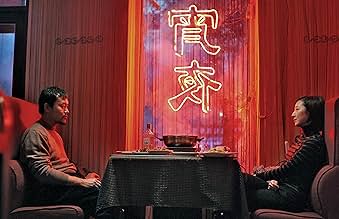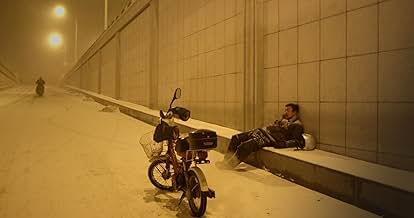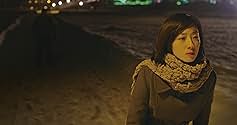CALIFICACIÓN DE IMDb
6.7/10
10 k
TU CALIFICACIÓN
Un expolicía y su antiguo compañero deciden seguir investigando una serie de asesinatos que acabó con sus carreras de forma humillante cuando descubren que estos vuelven a producirse.Un expolicía y su antiguo compañero deciden seguir investigando una serie de asesinatos que acabó con sus carreras de forma humillante cuando descubren que estos vuelven a producirse.Un expolicía y su antiguo compañero deciden seguir investigando una serie de asesinatos que acabó con sus carreras de forma humillante cuando descubren que estos vuelven a producirse.
- Dirección
- Guionista
- Elenco
- Premios
- 28 premios ganados y 46 nominaciones en total
- Dirección
- Guionista
- Todo el elenco y el equipo
- Producción, taquilla y más en IMDbPro
Opiniones destacadas
In snow covered streets surrounded by perpetual darkness detectives and suspects are made distinguishable only by the soft glow of neon signs. Faces are shrouded by shadow, characters motives are unclear. We are in very classic noir territory in Black Coal, Thin Ice.
A brutal murder occurs in Northern China. Severed limbs appear simultaneously across the country in coal plants. The investigation into the murder is botched, leaving detective Zhang Zili injured, ashamed and without a job. Five years later, body parts are found in coal plants. Now an alcoholic and working as a security guard, Zhang once again finds himself in the pursuit of the mysterious mass murderer. The only connection between the two cases is a beautiful dry cleaning assistant Wu Zhizhen, who soon becomes the object of Zhang's obsession.
An intriguing combination of neo-noir and Chinese realism, Black Coal, Thin Ice demonstrates director Yi'nan Diao's genre literacy. From the lighting, to the troubled anti-hero, to the femme-fatale, the film is full of noir tropes. What makes the film unique is the camera's continual shift to the mundane. Unlike the modern Tarantino-inspired trend, the revelations and acts of violence are down-played. Plot takes a back seat to atmosphere as the audience is immersed in a bleak, nihilistic vision of modern China.
Winner of the Golden Bear at the Berlin film festival, Black Coal, Thin Ice has been a hit with critics but it's hard to see it winning any audience awards. The slow pace and dark, defeatist world view will be a turn off for most audience but if you don't view those as detractors, and if you are a fan of noir then this is a film to see.
A brutal murder occurs in Northern China. Severed limbs appear simultaneously across the country in coal plants. The investigation into the murder is botched, leaving detective Zhang Zili injured, ashamed and without a job. Five years later, body parts are found in coal plants. Now an alcoholic and working as a security guard, Zhang once again finds himself in the pursuit of the mysterious mass murderer. The only connection between the two cases is a beautiful dry cleaning assistant Wu Zhizhen, who soon becomes the object of Zhang's obsession.
An intriguing combination of neo-noir and Chinese realism, Black Coal, Thin Ice demonstrates director Yi'nan Diao's genre literacy. From the lighting, to the troubled anti-hero, to the femme-fatale, the film is full of noir tropes. What makes the film unique is the camera's continual shift to the mundane. Unlike the modern Tarantino-inspired trend, the revelations and acts of violence are down-played. Plot takes a back seat to atmosphere as the audience is immersed in a bleak, nihilistic vision of modern China.
Winner of the Golden Bear at the Berlin film festival, Black Coal, Thin Ice has been a hit with critics but it's hard to see it winning any audience awards. The slow pace and dark, defeatist world view will be a turn off for most audience but if you don't view those as detractors, and if you are a fan of noir then this is a film to see.
An ex-detective re-investigates a strange unsolved murder case that effectively ended his career five years previously. In doing so he ends up becoming increasingly involved with a young woman who seems to be connected with a series of similar killings.
It was good to see an example of a Chinese neo-noir. My previous experience with films from China has been usually of movies of epic proportions with big production values. So it made for a refreshing change to see something more low-key and contemporary. This one sets out its stall very well with the sinister discovery of various body parts being found in bags of coal spread all over the country, huge distances apart. The introduction of a femme fatale into the mix only ups the intrigue level further. And I have to say that on the whole I did enjoy this film and found it compelling, with its Chinese origins ensuring that it was a little different and punctuated with unpredictable moments. By the end of the piece it would be only fair to say that some questions still remain. I thought the ending was really very strange indeed with an odd final few moments and an ambiguous feeling. It almost feels like a superfluous ending but maybe I missed something in it. In truth odd things happen on a number of occasions throughout this one and reasons are not always very forthcoming, I am guessing this is a film that would benefit from a re-watch possibly. Also good was the wintry atmosphere of the snowy locales where the action unfolds that created a feeling all of its own which worked well. But I would probably have to conclude that, while I definitely liked this one, it does falls short of being great. It's not really that suspenseful for this type of film and the plot development doesn't ultimately reveal all that good a mystery in the final analysis. Certainly a good enough movie I have to emphasise but it just has a few hard to ignore unsatisfying flaws as well though.
It was good to see an example of a Chinese neo-noir. My previous experience with films from China has been usually of movies of epic proportions with big production values. So it made for a refreshing change to see something more low-key and contemporary. This one sets out its stall very well with the sinister discovery of various body parts being found in bags of coal spread all over the country, huge distances apart. The introduction of a femme fatale into the mix only ups the intrigue level further. And I have to say that on the whole I did enjoy this film and found it compelling, with its Chinese origins ensuring that it was a little different and punctuated with unpredictable moments. By the end of the piece it would be only fair to say that some questions still remain. I thought the ending was really very strange indeed with an odd final few moments and an ambiguous feeling. It almost feels like a superfluous ending but maybe I missed something in it. In truth odd things happen on a number of occasions throughout this one and reasons are not always very forthcoming, I am guessing this is a film that would benefit from a re-watch possibly. Also good was the wintry atmosphere of the snowy locales where the action unfolds that created a feeling all of its own which worked well. But I would probably have to conclude that, while I definitely liked this one, it does falls short of being great. It's not really that suspenseful for this type of film and the plot development doesn't ultimately reveal all that good a mystery in the final analysis. Certainly a good enough movie I have to emphasise but it just has a few hard to ignore unsatisfying flaws as well though.
It seems that, every few years, there are one or two Chinese films that, despite being slow-paced, dark, and lacking A-list stars, somehow manage to attract a large domestic audience without being controversial enough to risk complete censorship. In 2014, the only example I have seen so far is this, Black Coal, Thin Ice. The reason for its domestic success is presumably because of its awards at the Berlin Film Festival.
As the story unfolds, despite being based around a series of murders, the film has a pace more similar to an art-house film than a crime- thriller. A couple of scenes were impressively disturbing, made even more so by the slow paced, subtle atmosphere surrounding them.
The setting of a polluted, dark, seedy city in a long Heilongjiang winter seems perfect for the noir tone of the film. A subtle musical score, with some dissonant strings combined with (terrible) Chinese pop songs (intra-diegetic) creates a fantastic atmosphere. The closest thing to it I have seen is Suzhou River, which, now I come to think of it, has a lot of similar motifs (I haven't seen Diao Yinan's previous films).
The acting performances were all impressive, the female lead (played by Taiwanese Gwei/Gui Lun-Mei) seemed suitably out of place in the Far Northeast of Mainland China. Liao Fan's male lead, and Wang Xuebing's character, were both impressive.
Despite a bit of dark humour that made me giggle, Black Coal, Thin Ice is a relentlessly grim and slightly disturbing film. I was impressed that it wasn't (more) censored in China, as it paints a pretty depressing picture. Despite being enthralled by the film, I won't be booking a flight to Heilongjiang any time soon.
As the story unfolds, despite being based around a series of murders, the film has a pace more similar to an art-house film than a crime- thriller. A couple of scenes were impressively disturbing, made even more so by the slow paced, subtle atmosphere surrounding them.
The setting of a polluted, dark, seedy city in a long Heilongjiang winter seems perfect for the noir tone of the film. A subtle musical score, with some dissonant strings combined with (terrible) Chinese pop songs (intra-diegetic) creates a fantastic atmosphere. The closest thing to it I have seen is Suzhou River, which, now I come to think of it, has a lot of similar motifs (I haven't seen Diao Yinan's previous films).
The acting performances were all impressive, the female lead (played by Taiwanese Gwei/Gui Lun-Mei) seemed suitably out of place in the Far Northeast of Mainland China. Liao Fan's male lead, and Wang Xuebing's character, were both impressive.
Despite a bit of dark humour that made me giggle, Black Coal, Thin Ice is a relentlessly grim and slightly disturbing film. I was impressed that it wasn't (more) censored in China, as it paints a pretty depressing picture. Despite being enthralled by the film, I won't be booking a flight to Heilongjiang any time soon.
A Chinese crime drama with a good storyline and convincing acting. Low key style with a mix of random everyday events and a police investigation. Filmed in a realist style with some surreal moments.
A series of murders, whose hallmarks are numerous body parts being found around the Province, perplex detectives and leave them with a failed investigation. A former member of the force, sacked for incompetence, takes the initiative and follows a lead.
Slow paced but gripping. We are given insights into the characters' lives, motivations and idiosyncrasies alongside their roles in the unfolding world of the murder investigation. What it lacks in action is made up for in a range of intriguing characters and quirky events.
A series of murders, whose hallmarks are numerous body parts being found around the Province, perplex detectives and leave them with a failed investigation. A former member of the force, sacked for incompetence, takes the initiative and follows a lead.
Slow paced but gripping. We are given insights into the characters' lives, motivations and idiosyncrasies alongside their roles in the unfolding world of the murder investigation. What it lacks in action is made up for in a range of intriguing characters and quirky events.
This 2014 Golden Berlin Bear winner (with a rare second Silver Berlin Bear award of BEST ACTOR for Fan Liao) is Chinese director Yi'nan Diao's third feature, and his first to be shown in cinemas and harvested over one hundred million RMB, roughly equivalent to 16 million dollars, thanks to the international accolades it received. Its original title can be translated verbatim as "White Day Fireworks", it is the name of a nightclub which would be revealed as a crucial thread to a murder case, furthermore Diao arranges a literal daytime firework show to climax the film in the coda, meanwhile, its official English title: Black Coal, Thin Ice, betrays the locations which relation all the murder cases during a five-year span.
The film starts in 1999, in an unspecified city in China's North-east province Heilongjiang, Zhang (Liao) is a recently-divorced policeman, during a fresh case of a dismembered body scattered in sundry collieries where an I.D. card indicates the dead is Liang (Xuebing Wang), but due to his negligence, two fellow policemen are killed in operation while Zhang is also wounded. After that, the time jumps to 2004, now Zhang is a life-beaten drunkard and works as a security guard, two new dismembered bodies have been found, all link back to Liang's wife Wu (Gwei), whose mysterious mien attracts Zhang, he embarks on a personal investigation to follow her, strike up a conversation with her in the dry-cleaner where she works, and eventually ask her out for an ice-skating date. But at the same time, danger is lurking around him too, is Liang really dead? Or is Wu as innocent as she looks? Can all the mysteries be brought into daylight in the end or is there another lie involved? Diao smugly leaves an semi-opening end with many spurious clues (e.g. the cremains Wu buried under the tree Vs. her apparent lie of discarding it over the sea during the inquiry), to prompt viewers for disparate interpretations.
This film is to a great extent inscribed as an art-house fare with its lurid background or foreground colour embedding in almost every scene, the visual palette is meticulously chosen and also overtly, Diao is a faithful apprentice of symbolism, from a battered ladybug on the bedsheets in the opening sequence, to an abrupt introduction of a deserted horse left by junkmen, until the firework finale reaches the hallmarks of its veiled fatalism pretentiousness buried in his not-so-justifiable script, there must be a more plausible reason behind a redemption by right of admitting a murder one might not execute, it unfortunately gives an impression of a desperate trick to glaze over the banality of the story, to romanticize the damsel-in-distress reverie.
The whole story is a dancing-on-the-edge between a sex-driven anti-hero and a irresolute femme fatale, with a jarring red herring which leads to nowhere. But the two leads are giving fantastic performances, Fan Liao breathes out the irascible mentality stinkingly inflicted on a non-starter who clings to the last straw and strives to feel the ardor of living again. While Lun Mei Gwei from Taiwan, may seem to be an odd choice for a North-east girl, heedfully, she doesn't have many lines to give away her southern accent, instead, relies on her body language and facial expressions, her air of mystique is the most enticing feature entraps audience even in the film's banalest moment.
Winning over the likes of BOYHOOD (2014, 8/10) and THE GRAND BUDAPEST HOTEL (2014, 8/10) in Berlin inevitably becomes an over-achievement for this intense crime-thriller, but put it among its Chinese peers of the same year, the film can excel most of them hands down, as one of the must-see from the over-ballooning market where ingrainedly burdened with shoddy soil damages its own commodities.
The film starts in 1999, in an unspecified city in China's North-east province Heilongjiang, Zhang (Liao) is a recently-divorced policeman, during a fresh case of a dismembered body scattered in sundry collieries where an I.D. card indicates the dead is Liang (Xuebing Wang), but due to his negligence, two fellow policemen are killed in operation while Zhang is also wounded. After that, the time jumps to 2004, now Zhang is a life-beaten drunkard and works as a security guard, two new dismembered bodies have been found, all link back to Liang's wife Wu (Gwei), whose mysterious mien attracts Zhang, he embarks on a personal investigation to follow her, strike up a conversation with her in the dry-cleaner where she works, and eventually ask her out for an ice-skating date. But at the same time, danger is lurking around him too, is Liang really dead? Or is Wu as innocent as she looks? Can all the mysteries be brought into daylight in the end or is there another lie involved? Diao smugly leaves an semi-opening end with many spurious clues (e.g. the cremains Wu buried under the tree Vs. her apparent lie of discarding it over the sea during the inquiry), to prompt viewers for disparate interpretations.
This film is to a great extent inscribed as an art-house fare with its lurid background or foreground colour embedding in almost every scene, the visual palette is meticulously chosen and also overtly, Diao is a faithful apprentice of symbolism, from a battered ladybug on the bedsheets in the opening sequence, to an abrupt introduction of a deserted horse left by junkmen, until the firework finale reaches the hallmarks of its veiled fatalism pretentiousness buried in his not-so-justifiable script, there must be a more plausible reason behind a redemption by right of admitting a murder one might not execute, it unfortunately gives an impression of a desperate trick to glaze over the banality of the story, to romanticize the damsel-in-distress reverie.
The whole story is a dancing-on-the-edge between a sex-driven anti-hero and a irresolute femme fatale, with a jarring red herring which leads to nowhere. But the two leads are giving fantastic performances, Fan Liao breathes out the irascible mentality stinkingly inflicted on a non-starter who clings to the last straw and strives to feel the ardor of living again. While Lun Mei Gwei from Taiwan, may seem to be an odd choice for a North-east girl, heedfully, she doesn't have many lines to give away her southern accent, instead, relies on her body language and facial expressions, her air of mystique is the most enticing feature entraps audience even in the film's banalest moment.
Winning over the likes of BOYHOOD (2014, 8/10) and THE GRAND BUDAPEST HOTEL (2014, 8/10) in Berlin inevitably becomes an over-achievement for this intense crime-thriller, but put it among its Chinese peers of the same year, the film can excel most of them hands down, as one of the must-see from the over-ballooning market where ingrainedly burdened with shoddy soil damages its own commodities.
¿Sabías que…?
- TriviaThe literal translation of the Chinese title is 'Daylight Fireworks'. This is the name of the nightclub where Zhang learns a major lead, and is also echoed in the last scene.
- ConexionesReferences Xia nu Shisan Mei (1986)
Selecciones populares
Inicia sesión para calificar y agrega a la lista de videos para obtener recomendaciones personalizadas
- How long is Black Coal, Thin Ice?Con tecnología de Alexa
Detalles
- Fecha de lanzamiento
- Países de origen
- Sitio oficial
- Idioma
- También se conoce como
- Black Coal, Thin Ice
- Locaciones de filmación
- Productoras
- Ver más créditos de la compañía en IMDbPro
Taquilla
- Total a nivel mundial
- USD 16,830,885
- Tiempo de ejecución1 hora 50 minutos
- Color
- Relación de aspecto
- 1.85 : 1
Contribuir a esta página
Sugiere una edición o agrega el contenido que falta

Principales brechas de datos
By what name was Tan negro como el carbón (2014) officially released in Canada in French?
Responda










